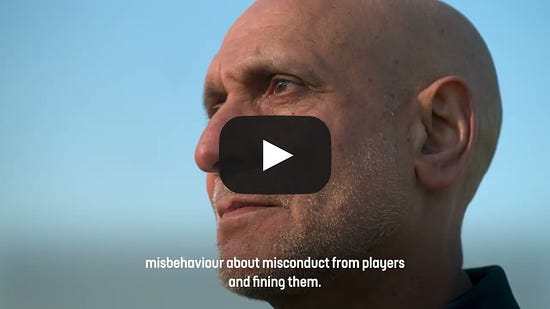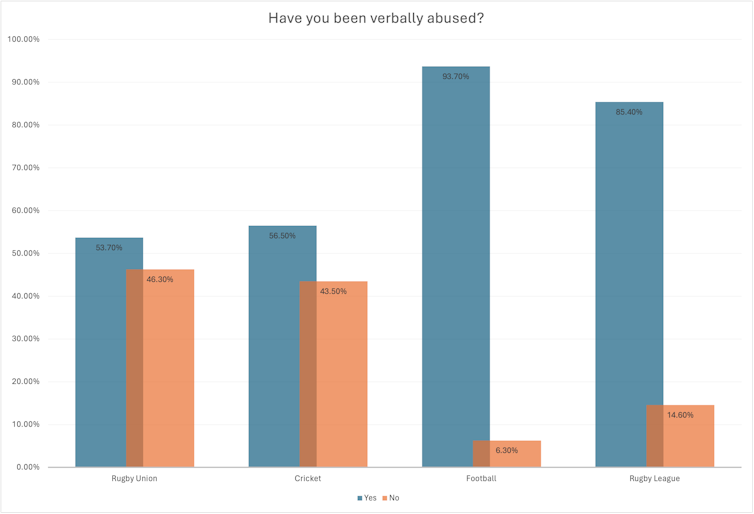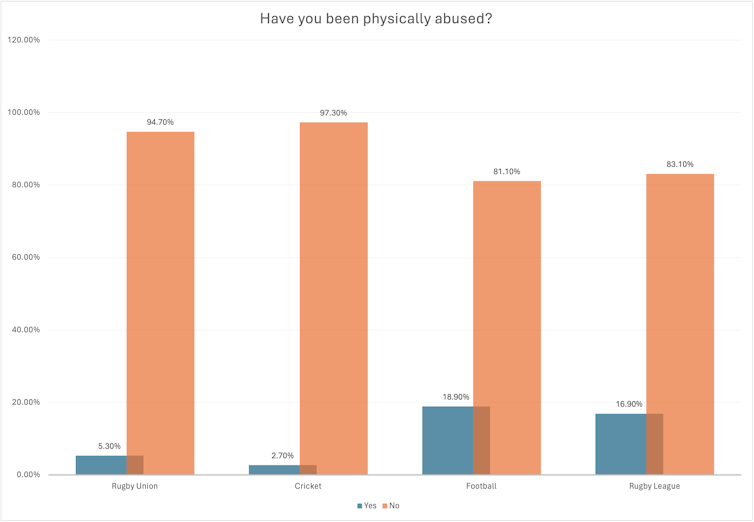The Signal - Football has a referee abuse crisis
Football has a referee abuse crisisBreaking down a study on why referees are being driven out of the gameDear reader, The last two days have been immensely challenging for me. On Wednesday, I woke up to find out that my pet Apple, a thirteen-and-a-half-year-old Beagle I’d adopted in 2012, had been severely dehydrated and was struggling to orient himself with his surroundings. Since that morning, he's been admitted to a pet hospital in Bengaluru and I haven't been able to focus on a story I was chasing. The good news: He is showing small signs of improvement on a 24-hour basis. I am hoping for a discharge tomorrow. All of this means that I am unable to publish a full story today. My apologies for yet another stop-start week. So for today, we are featuring an interesting story from The Conversation, besides the top sports business stories and long reads for the weekend. Also, do check out some of our previous stories including this from last week, where I took a detailed look at cricket’s American project, and how that is working out (notwithstanding the dream run of its national team in the T20 World Cup). Plus, how the world’s fastest-growing sport, padel, is finding its feet in India. Warm regards, Football’s referee crisis: we asked thousands of refs about the abuse and violence that’s driving them out of the gameBy Tom Webb and Harjit Sekhon
The Uefa European Football Championship – commonly known as the Euros – is one of the world’s most valuable sporting events. This summer’s 17th staging, which kicks off in Germany on June 14, is expected to generate commercial revenues of at least €2.4 billion euros (£2bn). Upwards of 5 billion TV viewers will watch the 51 matches, culminating in the final in Berlin’s Olympiastadion on 14 July. At the heart of this global spectacle are the 19 men whose job it is to keep order on the pitch. Their split-second decisions can decide the outcome of games – and infuriate legions of fans. They are regarded as the best referees in European football (plus one from Argentina) – but, like officials at all levels of the game, have endured abuse from players, coaches and spectators on their journey to the pinnacle of the sport. One of the two English referees at this year’s Euros, Michael Oliver, was subjected to particularly shocking abuse, including death threats, after awarding a last-minute penalty in a Champions League quarter-final in April 2018. And it wasn’t only him: Oliver’s wife Lucy, also a referee, was sent abusive text messages after her mobile phone number was posted on social media. Referees of past Euros have had to put up with similar treatment. After the Swiss referee Urs Meier disallowed a goal for England against Portugal in the 2004 quarter-final, he was given police protection and advised to go into hiding after receiving more than 16,000 emails from angry English fans. Stoking the abuse, the Sun newspaper printed his email address and laid out a giant England flag outside Meier’s office in Switzerland. Our recent survey of nearly 1,300 football referees across Europe, Oceania and North America suggests abuse of officials is now endemic at all levels of the game. In another study, more than 93% of football referees told us they had been verbally abused, while almost one in five reported physical abuse. Around half the referees we have contacted say they are considering quitting the game. As a result, football is lurching towards a crisis as it struggles to recruit and, in particular, retain referees at grassroots levels. While the game is booming across Europe, with girls’ and women’s leagues growing especially rapidly, it’s estimated that one in seven match officials quit every year, with the abuse they face a major cause. Uefa’s head of referees, Roberto Rosetti, calls it “a vocational crisis” that is also putting increased pressure on efforts to bring referees through to elite levels of the sport. In August 2023, Uefa launched its first ever recruitment campaign for referees – featuring Oliver in the promotional material. Uefa says it aims to enlist around 40,000 new referees each season throughout Europe. But unless there is a dramatic shift in the behaviour of players, coaches and spectators, Europe’s grassroot leagues will struggle to retain many of these recruits. While money continues to flood into elite football, volunteer referees of all ages will continue to turn their backs on “the beautiful game” for fear of the abuse they may face when they step on to a pitch.  ‘The referee pool is almost dry’In England, aggressive behaviour towards referees has become such a concern that in February 2023 the Football Association (FA) became the first governing body to trial the use of body cameras to reduce abuse towards referees at grassroots levels. Notices hang on the walls of dressing rooms and the fences of grounds asking players, officials and spectators to show more respect during games. Yet according to another referee we interviewed, these signs are “merely displayed as lip service”: I’d say county-level, Saturday football is probably the worst example of players using every conceivable way to win, whatever it takes. Abuse, cheap comments towards officials, and a general want to shout foul for almost every contact … Red and yellow cards have not thwarted the wall of abuse and unsporting action that is seen week in, week out. From 2016, 10,000 referees left English football in five seasons, with the COVID pandemic adding to the difficulty of recruiting replacements – leaving a major shortfall up and down the country. Bans of up to eight years have been imposed in recent seasons for the physical abuse of male and female referees, who have been kicked, headbutted, punched and spat on. In one local cup final, the BBC reported that the referee had been knocked to the ground and punched by “up to 20 people”. Even child referees making their first steps in the game are not immune from this treatment. In November 2021, all 13 and 14-year-old referees in Northumberland went on strike one weekend in protest at the levels of abuse they were receiving from parents and coaches. Martin Cassidy, chief-executive of the charity Ref Support, has warned that young officials are being turned off the game by the abuse they see and experience, to the extent that “the pool of new referees coming into the game is almost dry”. Such abuse is not a new phenomenon. The abuse of referees dates back before the formation of the English FA in 1863, when gamblers verbally and sometimes physically assaulted referees after blaming them for making decisions that affected the bets they had placed. But there are particular reasons for today’s worsening levels of abuse. We have been researching referee abuse in football and other sports around the world for the past two decades, and in 2020 published a ten-point plan for how to tackle this abuse. One of the problems frequently highlighted is that referees are seen as “outsiders” who players and spectators find it difficult to empathise with. As one interviewee in our Uefa-funded research of referee abuse in France and the Netherlands explained: I play football and am also a referee. From my experience, players, supporters and coaching staff don’t see refs as people, and tend to regard them as outsiders. I don’t think they realise how integral they are to allowing games to go ahead. Whether commenting on social media or shouting abuse from a crowded stand, the failure of people to recognise referees as “real human beings” is a recurring theme of our research. There is little understanding of the impact that abuse can have on an official’s mental wellbeing. As one grassroots referee told us:
The growth of social media and presence of online communities has compounded the sense that referees are “fair game” for criticism – without fear of any comeback. For spectators both virtual and real, abuse of officials can become infectious, as this experienced referee told us:
The (bad) influence of the professional gameThe frequent abuse of referees in the professional game is seen as a major contributory factor to problems lower down the football pyramid, as players and spectators take their lead from the behaviour they see in stadiums and on TV. In one shocking recent example, Turkish referee Halil Umut Meler was punched to the ground after the final whistle of a game in Turkey’s top professional league, putting him in hospital treatment with injuries including a small fracture under his eye. His attacker, the president of one of the clubs contesting the game, was subsequently arrested and banned from football for life. The eye-watering increases in television and sponsorship income, as well as prize money, means the pressure on professional football clubs to be successful has perhaps never been greater. As such, decisions made by referees over the course of a season, and particularly in the final stages of league and cup competitions, are increasingly being identified by clubs as a reason for falling short. Near the end of the most recent Premier League season, Nottingham Forest claimed on X after one defeat that the game’s video assistant referee (VAR) was a fan of rival club Luton Town – insinuating that this was a reason for their loss, and inflaming the anger of Forest supporters towards this official. Ironically, the introduction of VAR technology was seen as a way of protecting referees from making “clear and obvious errors” – yet many argue it has, in fact, only increased the pressure on referees and pushed them further into the spotlight. In a press conference after a victory for his Tottenham Hotspur team that was decided by a VAR error, Spurs manager Ange Postecoglou highlighted the need to remember the humans at the heart of every match decision – even those made many miles away by VAR officials:
What can be done to stop the abuse?
Many referees would like to see more education of players, fans and club officials – to remind them that, far from being a hindrance, grassroots referees are people who give up their time to enable everyone to enjoy the game. As this amateur referee explained:
But many referees also want more of a “stick” to eradicate abuse. Our research found that only a third of football referees surveyed across Europe, North America and Oceania were satisfied with the sanctions handed out after they had reported being abused:
In 2017-18, English amateur football piloted use of the “sin bin”, whereby players were temporarily removed from play for up to ten minutes if they abused a referee or their assistants. This trial was then extended to 31 amateur leagues across England, with suggestions that sin bins could be introduced in professional football along with a blue card to denote a player being temporarily sent off. One grassroots woman referee explained how she uses sin bins to de-escalate potentially difficult situations:
However, the International Football Association Board, which determines the laws of the game, has completely rejected the blue card proposal, demanding further evidence on the effectiveness of sin bins while trialling other ideas to improve the behaviour of professional players. These include proposed “cooling-off periods” which would see referees send teams to their respective penalty areas if behaviour is judged to be becoming too heated. Football is not aloneWhen it comes to referee abuse, football is far from alone in having a problem. Over half of the officials we surveyed across rugby union, rugby league and cricket reported being subjected to abuse and aggression. This account of refereeing abuse comes from grassroots rugby league:
This referee, who was 18 at the time, said the experience “took a massive toll” on his confidence and mental wellbeing:
While this referee has since restarted their career and is aiming to reach the top of the professional game, many others do not restart after such experiences. Rates of verbal and physical abuse reported by referees at all levels of four sports, England: Even rugby union, which is traditionally associated with players calling officials “sir” and accepting decisions without question, is wrestling with how to eradicate growing levels of abuse at all levels of the game. After rugby union’s 2023 world cup final between New Zealand and South Africa, the match referee, Wayne Barnes, and his family were subjected to death threats including that their house would be burned down. Barnes subsequently retired from refereeing, a decision he said was influenced by the “threats that have become far too regular for all of those involved in the game”. In both rugby codes, the behaviour of spectators and players is a growing concern at all levels. To help recruit and support young referees in rugby league, for example, head cameras known as RefCam have been introduced to monitor the abuse they receive. Abuse of young refereesYoung referees in any sport are learning, just as players are learning. Yet according to some club officials we have spoken to, abuse is often worse towards these young officials than adult referees:
There are, first and foremost, child protection considerations with young referees if they are receiving abuse from adults. I (co-author Tom Webb) have coached in youth sport myself, and seen referee abuse first-hand from coaches, players and spectators. When the behaviour is challenged, invariably the coaches don’t see what they have done as wrong, or they do not care. This abuse is often adults behaving negatively towards young referees who have recently qualified and are under 18. This presents a clear safeguarding issue, yet in the context of football, abuse towards child referees appears to be widely considered “part of the game”. Parents of young referees complain that safeguarding rules are not being followed by sports’ governing bodies, and that the processes of complaint – in particular, children having to attend personal hearings with the adult coaches or spectators they have complained about – make it much harder for them to report abuse. At the same time, we have also heard positive accounts of the value of mentorship schemes, such as from this young female football referee:
What can be done to halt the abuse?Our recent research into the recruitment and retention of female sports officials across Europe shows they believe they receive less abuse than their male counterparts. However, the abuse that female officials face is still evident and, like their male counterparts, makes them much more likely to quit their chosen sport. Abuse is threatening the very structure of organised, competitive sport. As the number of fixtures without neutral referees increases, so grassroots sport becomes ever harder to administrate and operate effectively. The aim of reducing or eradicating the abuse towards referees should be a primary focus for sports organisations around the world. Supporters’, players’ and coaches’ better understanding the laws of a sport could help acceptance around why a decision is made by a referee during a fixture. But this alone will not reverse the recruitment and retention issues in refereeing. Based on our research, we believe the focus needs to be two-fold: reduce the abuse levels by changing the culture towards referees in sport; and ensure the systems are in place to support referees and punish offenders adequately when abuse occurs. We cannot be naive enough to think that abuse towards referees can be removed entirely from competitive sport. The question is, do sports organisations have the sufficient will to affect change and significantly reduce abuse? From our two decades studying this issue, we can say that most sports have been far too slow to address this endemic issue. There are, though, finally signs of a willingness to confront the problem – driven in part by growing awareness of the problems of recruiting and retaining referees that these organisations face. But for any recruitment drives to succeed, there must be a cultural change that raises the profile and importance of sports officials – and above all, addresses the shocking treatment of our young referees. Without this, we believe many sports – not only football – could face a severe shortage of grassroots officials, and subsequently elite-level referees. As one rugby union touch judge reflected to us:
Tom Webb and Harjit Sekhon are assistant professors at the Centre for Business in Society, Coventry University. The article is republished from https://theconversation.com under a Creative Commons license. Read the original article at https://theconversation.com/footballs-referee-crisis-we-asked-thousands-of-refs-about-the-abuse-and-violence-thats-driving-them-out-of-the-game-231886 ⚡️ Quick Singles🥊🇸🇦💰: Saudi Arabia’s Public Investment Fund (PIF) is reportedly looking to create a boxing league via a $4-5 billion joint venture with the sport’s leading promoters, Reuters reported. The report added that PIF was in discussions with Matchroom Boxing and Golden Boy Promotions for the venture, where it will have a minority stake. Last year, a PIF-owned vehicle SURJ Sports Investment acquired a stake in the US’ Professional Fighters League. 🔴⚽👍🏼: Dutchman Erik Ten Hag will remain as Manchester United manager following the club’s end-of-season review. Ten Hag’s future was uncertain after INEOS’ minority investment into United, which gave Sir Jim Ratcliffe control over football operations. United had one of their worst seasons in the Premier League since its inception, finishing eighth. However, they managed to win the FA Cup last month, defeating rivals Manchester City. 😱💵🚨: M Selvakumar, owner of the Tamil Nadu Premier League franchise Salem Spartans, was reportedly duped of Rs 6.1 crore under the pretext of buying shares in a Caribbean Premier League (CPL) team. Selvakumar had registered a first information report last month, while naming domestic cricketers Robin Bist and Akash Sumra in the report. Now, the Board of Control for Cricket in India’s anti-corruption unit has taken cognizance of the case and could launch an inquiry. 🎾💰🏆: The All England Lawn Tennis Club, which organises Wimbledon, has announced a record prize money worth £50 million ($64 million) for the 2024 edition, an 11.9% (£5.3 million) increase from last year. Both the men’s and women’s singles champions will receive £2.7 million each, while losing finalists will haul £1.4 million each. RIP 🙏🏽: Amol Kale, president of the Mumbai Cricket Association (MCA), passed away in New York following a cardiac arrest. Kale was in the city to attend the T20 World Cup clash between India and Pakistan, along with a host of dignitaries. Kale had been helming the MCA since October 2022, after defeating former Indian cricketer Sandeep Patil to the post. Kale was considered close to Maharashtra Deputy Chief Minister Devendra Fadnavis, going back to their Nagpur days. Kale also co-promoted the Indian Street Premier League, a franchise-based tennis ball cricket tournament. 📖 Weekend ReadsThe Richest League On Earth Is Tearing Itself Apart [Wall Street Journal] Inside USA Cricket’s Incredibly Unlikely, Maximally Joyful World Cup Run [GQ] Hungary, Viktor Orban and the weaponisation of a national football team [The Athletic] You can reach out to me at venkat@thecore.inwith any feedback (good, bad, or ugly), tips, and ideas. I take my mailbag seriously, and would love to hear from you! You can also connect with me on X (@venkatananth) and LinkedIn. Thanks for reading, and see you again next Friday! The Playbook By The Signal is free today. But if you enjoyed this post, you can tell The Playbook By The Signal that their writing is valuable by pledging a future subscription. You won't be charged unless they enable payments. |
Older messages
Agnipath is not soldiering on
Friday, June 14, 2024
Also in today's edition: Adani's cement spree; McKinsey's all tell, little show ͏ ͏ ͏ ͏ ͏ ͏ ͏ ͏ ͏ ͏ ͏ ͏ ͏ ͏ ͏ ͏ ͏ ͏ ͏ ͏ ͏ ͏ ͏ ͏ ͏ ͏ ͏ ͏ ͏ ͏ ͏ ͏ ͏ ͏ ͏ ͏ ͏ ͏ ͏ ͏ ͏ ͏ ͏ ͏ ͏ ͏ ͏ ͏ ͏ ͏ ͏ ͏ ͏ ͏ ͏
Cricket hopes for a good Yankee innings
Thursday, June 13, 2024
Also in today's edition: Sanjeev Krishan makes a case for himself; Can't live with China, can't live without China ͏ ͏ ͏ ͏ ͏ ͏ ͏ ͏ ͏ ͏ ͏ ͏ ͏ ͏ ͏ ͏ ͏ ͏ ͏ ͏ ͏ ͏ ͏ ͏ ͏ ͏ ͏ ͏ ͏ ͏ ͏ ͏ ͏ ͏ ͏ ͏ ͏
Will slow and steady win this race?
Wednesday, June 12, 2024
Also in today's edition: Silver lining for India Inc.; NEET is a failure ͏ ͏ ͏ ͏ ͏ ͏ ͏ ͏ ͏ ͏ ͏ ͏ ͏ ͏ ͏ ͏ ͏ ͏ ͏ ͏ ͏ ͏ ͏ ͏ ͏ ͏ ͏ ͏ ͏ ͏ ͏ ͏ ͏ ͏ ͏ ͏ ͏ ͏ ͏ ͏ ͏ ͏ ͏ ͏ ͏ ͏ ͏ ͏ ͏ ͏ ͏ ͏ ͏ ͏ ͏ ͏ ͏ ͏ ͏ ͏ ͏ ͏
Status quo in progress
Tuesday, June 11, 2024
Also in today's edition: Tata EVs flashing red; Toll-collecting satellites ͏ ͏ ͏ ͏ ͏ ͏ ͏ ͏ ͏ ͏ ͏ ͏ ͏ ͏ ͏ ͏ ͏ ͏ ͏ ͏ ͏ ͏ ͏ ͏ ͏ ͏ ͏ ͏ ͏ ͏ ͏ ͏ ͏ ͏ ͏ ͏ ͏ ͏ ͏ ͏ ͏ ͏ ͏ ͏ ͏ ͏ ͏ ͏ ͏ ͏ ͏ ͏ ͏ ͏ ͏ ͏ ͏ ͏ ͏ ͏ ͏
Modified with props
Monday, June 10, 2024
Also in today's edition: Too hot to work; Data leak in cop app ͏ ͏ ͏ ͏ ͏ ͏ ͏ ͏ ͏ ͏ ͏ ͏ ͏ ͏ ͏ ͏ ͏ ͏ ͏ ͏ ͏ ͏ ͏ ͏ ͏ ͏ ͏ ͏ ͏ ͏ ͏ ͏ ͏ ͏ ͏ ͏ ͏ ͏ ͏ ͏ ͏ ͏ ͏ ͏ ͏ ͏ ͏ ͏ ͏ ͏ ͏ ͏ ͏ ͏ ͏ ͏ ͏ ͏ ͏ ͏ ͏ ͏ ͏ ͏ ͏ ͏ ͏
You Might Also Like
From 0 to $5B (local non-US market)
Tuesday, March 4, 2025
I love that you're part of my network. Let's make 2025 epic!! I appreciate you :) Today's hack From 0 to $5B (local non-US market) Nadiem Makarim is a guy who managed to create
Quiet quitting is out. Revenge quitting is in? 😜
Tuesday, March 4, 2025
Do it loud. Do it proud, I guess.
Building complete rank and rent sites in just minutes
Monday, March 3, 2025
This tool is incredible
🌁#90: Why AI’s Reasoning Tests Keep Failing Us
Monday, March 3, 2025
we discuss benchmark problems, such as benchmark saturation, and explore potential solutions. And as always, we offer a curated list of relevant news and important papers to keep you informed
I interviewed THE largest Amazon Seller [Roundup]
Monday, March 3, 2025
Need funding for your Canadian Amazon business? Not sure if you should use a Canadian corporation or US LLC to form your company? We'll cover these questions and more in our Start and Grow Your FBA
The state of data-driven decision-making for CPG brands
Monday, March 3, 2025
How marketers use purchase insights to maximize campaign performance
Facebook updates, TikTok ROI, Instagram format matches, and more
Monday, March 3, 2025
Today's Guide to the Marketing Jungle from Social Media Examiner... presented by social-media-marketing-world-logo New week, fresh insights, Reader! Stay sharp with the latest updates on AI, social
Are you losing revenue to rivals?
Monday, March 3, 2025
This is a challenge that costs businesses millions every year: Their customers are switching to competitors for various reasons... even though most of them could easily be fixed. On Tuesday, March 4,
DeepSeek’s 545% Profit Claim
Monday, March 3, 2025
PLUS: Siri 2027?!
Insurtech VC resets, readies for growth
Monday, March 3, 2025
Europe's share of regional IPOs sinks; the agtech revolution is now; hope flares for natural gas deals Read online | Don't want to receive these emails? Manage your subscription. Log in The




